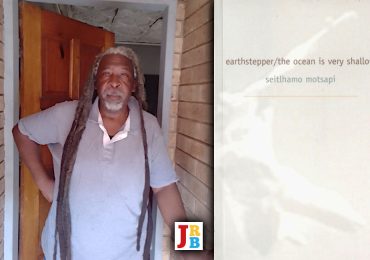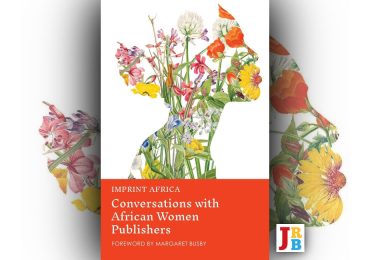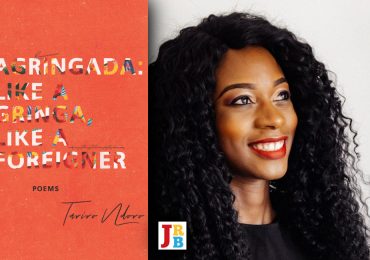The JRB City Editor Niq Mhlongo traveled to Harare recently, for two joint book launches with Zukiswa Wanner. Don’t miss the gallery of photographs at the end of the piece; and don’t miss Mhlongo and Wanner’s notes on being Fellows together at the Johannesburg Institute for Advanced Study, elsewhere in this issue.
My friend and fellow scribe Zukiswa Wanner may not remember this, but the planning of our successful joint book launches in Harare was hatched after a beautiful karaoke song. It was on the Monday of the first week of March, and Zukiswa and I were at Xai Xai restaurant on 7th Street in Melville, Johannesburg. We wanted a place to celebrate the publication of Hardly Working: A Travel Memoir of Sorts and Soweto, Under the Apricot Tree: Stores, which had been published a week apart. Xai Xai was the obvious choice for the festivities, because it’s right near where we are both staying at the moment, in Westdene, as fellows at the Johannesburg Institute for Advanced Study (JIAS).
Mondays at Xai Xai are always the best: it’s karaoke night. Even those of us who can’t sing go up onto the stage after 7 pm, and that’s exactly what happened that particular Monday. Since I know a few Bob Marley songs, I asked the DJ to play ‘Zimbabwe’. As the song started, Zukiswa joined me at the mic. I must tell you that I’m a much better singer than her. [Debatable. —Ed.]
Every man gotta right to decide his own destiny,
And in this judgement there is no partiality.
When the song ended, we went back to our beers and started to talk about something more serious—our books.
‘My friend, why don’t we do a couple of book launches together?’ Zukiswa suggested. ‘I’m planning to do a launch in Harare soon. Would you like to join me?’
At first, I was not sure about going to Harare. I’ve been to Zimbabwe a couple of times, but only as far as Bulawayo and Victoria Falls. Besides, former President Robert Mugabe had just been toppled a few months before and I sensed that the situation was still tense. But after two or three cold ones Zukiswa had sold me on the idea. After all, I had always wanted to go to Harare, and this was an opportunity to introduce myself to the Harare community of book lovers.
‘But what about the cost and logistics, like accommodation and travel?’ I asked
‘Don’t worry about that,’ Zukiswa assured me. ‘I’ve already arranged with the Zimbabwe Writers Association and my friend Regina. Accommodation for you is already sorted out with my friend Farai Mudzingwa, he’s a very interesting writer from Harare. You only need bus fare and your books to sell.’
There and then, we set the date of Monday, 26 March for our departure. Zukiswa said she would buy the return bus tickets for both of us, and in the meantime I was going to order copies of my book. I only had ten copies of Soweto, Under the Apricot Tree left after its very first launch, at Sol Plaatje University in Kimberley.
The day of our departure arrived and I still didn’t have enough copies to take with me to Harare. My order hadn’t arrived on time and I was tempted to cancel the trip. But how could I disappoint Zukiswa after all the planning? I comforted myself with the thought that there were other enticing things to do in Zimbabwe besides book launches. We were planning to go and watch a play called ‘Operation Restore Regasi’, a satire based on the final days of Mugabe’s thirty-seven year rule. We were also invited to a wedding anniversary celebration near Nyanga in Manicaland. Those who have been to Zimbabwe will tell you that you haven’t seen the beauty of the Zimbabwean landscape until you’ve been to this province. I had everything to lose if I didn’t go with Zukiswa.
Early in the morning I decided to take a chance and call my two friends who own bookstores in Jozi—Fort Helepi of African Flavour Books and Griffin Shea of Bridge Books—to find out if they had any copies of my new book. Both of them were nearly sold out, with two and three copies, respectively. I asked them to spare those copies for me, as well as any copies they had of Way Back Home, my previous book, and they agreed readily. The trip was on.
When Zukiswa and I left Park Station for Harare at eight o’clock that evening, I only had twenty books on me. But I convinced myself that this was enough: after all, I was going to be introducing myself to the Harare book world for the first time. Zukiswa, on the other hand, had a huge bag full of her books. She was well aware what Harare readers are capable of …
We arrived at the Beitbridge border post at about 3 am. To our surprise, the passport processing and paperwork on both the South African and Zimbabwe sides took less than an hour. We jokingly concluded that maybe the new presidents in both countries, Emmerson Mnangagwa in Zimbabwe and Cyril Ramaphosa in South Africa, had something to do with the improvement.
When we reached the Zimbabwean side, as soon as the bus stopped, hawkers, both men and women, ran towards the door flashing three currencies in their hands: Zimbabwean bonds, rands and US dollars. They also sold Zimbabwean cell phone starter packs.
‘I think we must change some of our rands into Zim bonds here,’ Zukiswa said. ‘I’m not sure we’ll be able to do that once we’re in Harare.’
‘Does this mean Zimbabwe no longer uses US dollars?’ I asked.
‘They do,’ she replied, ‘but most shops prefer the Zim bonds nowadays.’
Zukiswa and I each changed three hundred rands for about twenty-five Zimbabwean bonds. She also bought a Zimbabwean cellphone starter pack, no sim card registration necessary. Soon we were back on the bus.
‘This Greyhound bus is very effective, more than any other bus I’ve used to get to this border,’ Zukiswa told me, as the bus turned in the direction of Masvingo. ‘It normally takes up to three hours or more to get cleared at customs. I think the overpricing of their bus fare also includes the bribe money for the border officials.’
We both laughed.
‘I think our R1,442 return ticket was well spent if that is the case,’ I said.
‘Intercape may be cheaper, but people on that bus think everyone is Christian,’ Zukiswa continued. ‘They always pray inside that bus, before you leave Joburg, at the border, and when you arrive—always wasting passengers’ reading time.’
What she said made sense. Several buses had arrived before us, including the Intercape, but our Greyhound was given preference by the immigration officials, and they searched us only briefly before letting us go, leaving the other buses in our dust.
On the road, the first post-Mugabe change I noticed was that the notorious police roadblocks and the US dollar tollgates one would normally encounter were nowhere to be seen. The bus stopped at Masvingo at about seven in the morning, as the sun was rising. Most passengers got out to use the bathroom, while a few collected their bags as this was their final destination. The door of the bus was quickly swarmed by hawkers selling the three currencies, as well as roasted and boiled peanuts and mealies, and an assortment of fruits. After fifteen minutes we were ready to continue with our journey to Harare.
We passed the gentle slopes of the ancient hills, flat-topped thorn trees, scowling boulders against the silver sky, until we saw the distant view of Harare city, which was soon looming ahead of us. It was already two in the afternoon and it had started to drizzle. Because of this the bus was crawling at about sixty kilometers per hour. Zukiswa started calling her host, Angie, her high school friend, to tell her that our arrival was imminent. She lived not far from Farai, who was to be my host, in Marlborough.
Our joint book launches took place on Thursday, 29 March. The first was at the National Gallery Of Zimbabwe at two in the afternoon, and the second at six-thirty in the evening at Regina Chinyanga’s house in Highlands. Regina is another of Zukiswa’s school friends, and the sister of author Petina Gappah. The gallery launch was well attended, and to my surprise a few people even knew who I was. Writers Percy Zvomuya and Panashe Chigumadzi came through as well. Fifteen of my twenty books were sold, at fifteen US dollars each, within two hours. Worried that I would not have any left for the second launch, I decided to hide the last five copies.
At Regina’s place there was a crowd of about twenty-five people, and my last five copies were sold even before the launch began. The most beautiful moment was that Regina’s mom welcomed us warmly to her home, and stayed until the end at about ten o’clock. After the launch we went to the Reps Theatre pub, and I was able to do some reflecting. I was annoyed with myself for underestimating these two Harare launches. I should have brought at least fifty, or even hundred books to sell. But we made plans to return to Harare in September, and then I will make sure to bring two suitcases full of my books.
But there is another side of Harare that won my heart, besides its appreciation of and love for literature. Its people are friendly and humble. People like Fungai, Farai, Angie, Bella, Felix, Esther, Dolly, Sekuru and others welcomed me with warm hearts and open arms. I’ll never forget the road trip we took to Nyanga and Troutbeck with Angie, Bella, Zukiswa and Felix; it was as if we had known each other for ages. Even having to sleep in the car, when we couldn’t find our way back to the hotel after the wedding anniversary, didn’t bother us in the slightest.
Now I think I have a clear understanding of why one of my favourite bands called themselves Harari after changing their name from The Beaters. I think the band members, who included Sipho ‘Hotstix’ Mabuse and Oom Alec Khaoli, were trying to capture the soul and heartbeat of Harare with their name change. Harare—you never sleep in that city. Its human soul penetrates the eye—just like it must have done when The Beaters toured back in the nineteen-seventies. For me, Harare represents the beautiful shining spirit of a modern African city.
- Niq Mhlongo is City Editor; his latest book is an anthology of short stories, Soweto, Under the Apricot Tree. Follow him on Twitter.





